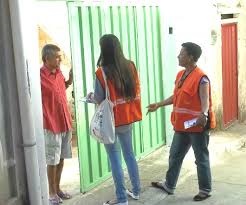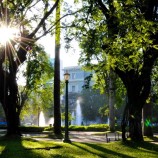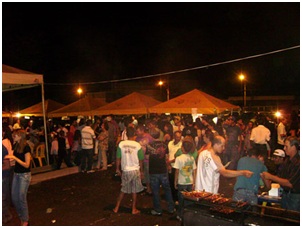Starting from Saturday, the 8th of February, a very organized door to door selective collection service will be deployed in the Betânia quarter and adjacent neighborhoods in the western section of Belo Horizonte. The locality until recently was a housing area, inhabited mostly by industrial workers. Today it is also comprised in part by the lower middle class.
Henrique, the project’s specialist, responsible for putting into action the social mobilization necessary for its deployment, developed a well-planned door to door approach for the entire team at the Department of Social Mobilization. The process is easy going and the job flows in a cheerful and relaxed way.
More than anything else, for the pleasure of participating and establishing working relationships with the local population, there I was with my 72-years and everything, standing beside boys and girls sprouting in their 20’s, give or take. They are interns, trainees and young social workers. The work is arduous, even more so in this relentless and cloudless sunshine scaling up to 104 degrees Fahrenheit. We amply apply sunscreen to our faces and arms, but the heat and strident brightness require a reserve tank of health and vigor to endure.
Our door-to-door discourse is adapted to the type of person who answers the doorbell. We work through people of various professions and ages: young men and women, elderly persons, housewives, retirees and pensioners. We deliver to each resident, or business owner in the case of commercial premises, an explanatory booklet which teaches step-by-step how paper, plastic, metal and glass should all be separated. The reactions are varied. We’ve heard them all, but we only take the positive messages with us.
Each one of us has to walk up and ring the doorbell, or intercom for apartment buildings, bang on the front gates and even shout “town hall!” and wait for the unpredictable door answers. We explain in an individual and particular way how the materials, which must be dry and clean, must be separated placed in a plastic bag and left in front of the residence, building or establishment before Saturday 8am from that day onward. Some strike up conversation, ask questions and show their curiosity of the complexity of this selective collection process. Some have even asked how the garbage men will know what is and what is not recyclable. Others seem very satisfied and cheerfully remark, “Well it’s about time our neighborhood had recycling too.”
Now the town administration can rightly boast about extending selective collection beyond the privileged elite neighborhoods of Belo Horizonte.
The interesting thing is that people have already heard of selective collection in most homes. What is missing is the practice. This practice, to transform information into action, is the big step to a new culture of waste disposal. The biggest result held from the implementation of selective collection is public awareness about what can be recycled, which implies to more raw material and increased economy of recycled products.
The more enlightened might argue that this task should be taken out by the very companies, industries, and trademarks that generate these materials: the so-called reverse logistics.
Reverse logistics is the area of logistics that deals with the aspects of returning products or packaging materials to its production center.
It’s an intelligent position. The generators of these materials should indeed be responsible for their recollection.
In its current phase, selective collection is a modality of trash collection with costs incurred by the government, i.e. you and I; we all pay for a collection service which should be an onus for the manufacturers of such products and their packaging as well as recyclable materials in general.
This selective collection project currently supplies old barns for waste pickers who formerly worked on the streets and today are endeavored to sorting, baling and marketing the subsequent recyclable materials for an income which pays them for their labor. And, in my view, selective collection opens the vision and consciousness of average people about the value of these materials and—who knows?—in a few years we will make reverse logistics a reality.
Related Articles













